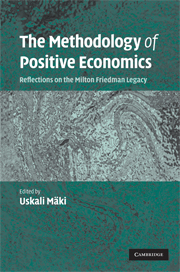Book contents
- Frontmatter
- Contents
- List of figures
- List of tables
- Contributors
- Preface
- Part 1 The classical essay in twentieth-century economic methodology
- Part 2 Reading and writing a classic
- Part 3 Models, assumptions, predictions, evidence
- Part 4 Theoretical context: firm, money, expected utility, Walras and Marshall
- 8 Friedman's 1953 essay and the marginalist controversy
- 9 Friedman (1953) and the theory of the firm
- 10 Friedman's selection argument revisited
- 11 Expected utility and Friedman's risky methodology
- 12 Milton Friedman's stance: the methodology of causal realism
- 13 On the right side for the wrong reason: Friedman on the Marshall–Walras divide
- Part 5 Concluding perspectives
- Index
8 - Friedman's 1953 essay and the marginalist controversy
Published online by Cambridge University Press: 02 December 2009
- Frontmatter
- Contents
- List of figures
- List of tables
- Contributors
- Preface
- Part 1 The classical essay in twentieth-century economic methodology
- Part 2 Reading and writing a classic
- Part 3 Models, assumptions, predictions, evidence
- Part 4 Theoretical context: firm, money, expected utility, Walras and Marshall
- 8 Friedman's 1953 essay and the marginalist controversy
- 9 Friedman (1953) and the theory of the firm
- 10 Friedman's selection argument revisited
- 11 Expected utility and Friedman's risky methodology
- 12 Milton Friedman's stance: the methodology of causal realism
- 13 On the right side for the wrong reason: Friedman on the Marshall–Walras divide
- Part 5 Concluding perspectives
- Index
Summary
Introduction
The marginalist controversy of the 1940s was arguably one of the debates through which modern microeconomic theory – that underlying Paul Samuelson's “neoclassical synthesis” – was established (Backhouse 2003). Milton Friedman's “The methodology of positive economics” (1953) played a major role in the resolution of that controversy and many of the ideas on which the essay was based arose out of it. The marginalist controversy, narrowly defined, took place in 1946–7, sparked by the challenge to marginal theory made by Richard Lester, a labor economist. Section 2 outlines this controversy, picking out aspects that are relevant to understanding Friedman's essay. However, this controversy formed part of a much broader, more complicated debate over price theory and the theory of the firm, drawing on and responding to the “full-cost pricing” debates of the 1930s (see Lee 1984; Lee and Irving-Lessman 1992; Mongin 1992; Hausman and Mongin 1997). It also fed into further debates on the theory of the firm that took place in the first half of the 1950s. These are discussed in sections 3 to 5. Section 6 then considers the way in which Friedman responded to the challenge posed by this controversy, drawing on his correspondence with Don Patinkin over the period 1948 to 1950. This leads, in section 7, into a discussion of F53 in relation to these controversies.
The marginalist controversy of 1946–7
Lester (1946) approached the subject of marginalism as a labor economist aware of a large gap between the way the labor market was treated in price theory and in macroeconomics.
- Type
- Chapter
- Information
- The Methodology of Positive EconomicsReflections on the Milton Friedman Legacy, pp. 217 - 240Publisher: Cambridge University PressPrint publication year: 2009
- 11
- Cited by



